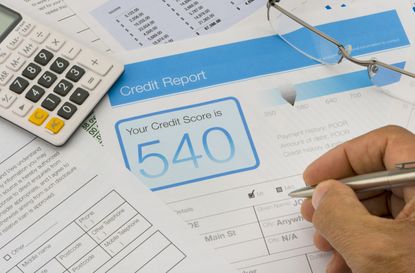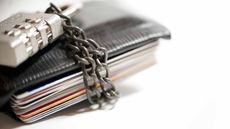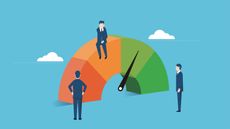Don't Sweat Small Changes in Your Credit Scores
Credit scores typically fluctuate a little from month to month, often because of changes in credit card balances. Here’s what to do when fluctuations in your scores are more dramatic.


Question: Recently my credit score dropped from “exceptional” to “very good.” I put a security freeze on all of my credit reports, and I closed out an auto loan around the same time. Did either of those actions cause my score to drop?
Answer: Neither of those actions is likely to have had an effect on your scores, says credit expert John Ulzheimer, formerly of credit-scoring company FICO and credit bureau Equifax. He advises people to stop worrying about minor changes in credit scores. “There’s a natural migration to your scores, normally 20 to 25 points month over month,” he says. “Your scores should stay within that range and, if so, it means your scores are moving in a normal, healthy manner.”
A credit freeze doesn’t hurt your credit scores, says Ulzheimer. “Security freezes simply restrict access to your credit reports to existing creditors” plus a handful of other parties such as government agencies and collection agencies, he says. “But the scoring systems are still able to see all of your information during the scoring process.” A freeze can help protect you from identity theft, but it can also make some things more complicated—such as applying for insurance or opening a bank account. (See the related article Pitfalls of Freezing Your Credit).

Sign up for Kiplinger’s Free E-Newsletters
Profit and prosper with the best of expert advice on investing, taxes, retirement, personal finance and more - straight to your e-mail.
Profit and prosper with the best of expert advice - straight to your e-mail.
Also, paying off an auto loan doesn’t cause a score to drop, Ulzheimer says. But, he points out, it isn’t likely to help your scores, either, because installment debt has only a small impact on your scores.
Ulzheimer says that small score changes often stem from fluctuations in credit card balances, which cause your debt-to-credit ratios to rise and fall. Nearly 30% of your FICO score (the credit score most lenders use) is based on amounts you owe. Keep an eye on your credit utilization ratio, which is the percentage of available revolving-account credit you’re using. If the total credit limit for all of your credit cards together is $20,000 and you’ve charged $2,000, for example, your utilization ratio is 10%.
Even if you pay the full credit card balance by the payment due date, your utilization ratio won’t necessarily be zero because the ratio is based on the balance your lender reported to the credit bureau—which is usually the balance from your monthly statement. It helps to keep your utilization ratio particularly low for a month or two before you apply for a loan, either by charging very little or by making sure to pay off your balances before they’re reported to the credit bureau. For more information, see the Amounts Owed explanation at MyFico.com.
For more information about credit scores, see How Your Credit Score Is Calculated and MyFico’s credit basics page.

As the "Ask Kim" columnist for Kiplinger's Personal Finance, Lankford receives hundreds of personal finance questions from readers every month. She is the author of Rescue Your Financial Life (McGraw-Hill, 2003), The Insurance Maze: How You Can Save Money on Insurance -- and Still Get the Coverage You Need (Kaplan, 2006), Kiplinger's Ask Kim for Money Smart Solutions (Kaplan, 2007) and The Kiplinger/BBB Personal Finance Guide for Military Families. She is frequently featured as a financial expert on television and radio, including NBC's Today Show, CNN, CNBC and National Public Radio.
-
 Why United Airlines Stock Is Flying Higher After Earnings
Why United Airlines Stock Is Flying Higher After EarningsUnited Airlines beat expectations for the first quarter and its stock is by soaring. Here's what you need to know.
By Joey Solitro Published
-
 Super Micro Computer: Why This Hot Stock Could Hit $1,500
Super Micro Computer: Why This Hot Stock Could Hit $1,500Super Micro Computer's long-term AI revenue potential is underappreciated, Loop Capital says. Here's what you need to know.
By Joey Solitro Published
-
 How Many Credit Cards Should I Have?
How Many Credit Cards Should I Have?How many credit cards should you have? The answer isn’t as straightforward as you might think — it all depends on your financial situation.
By Erin Bendig Last updated
-
 Freeze Your Credit in 3 Steps
Freeze Your Credit in 3 Stepscredit & debt Freezing your accounts at the three major credit bureaus is the best way to prevent thieves from opening new credit accounts in your name.
By Lisa Gerstner Published
-
 How to Monitor Your Credit Reports for Free
How to Monitor Your Credit Reports for Freecredit reports Don't get suckered into paying for credit monitoring services. There are free options all around.
By Rivan V. Stinson Last updated
-
 Did Equifax Botch Your Credit Score?
Did Equifax Botch Your Credit Score?credit score Equifax is in the news–yet again–this time for sending lenders the wrong credit score. Here’s how to find out if you were affected and what to do next.
By Rivan V. Stinson Published
-
 Two Updates to Credit Reports
Two Updates to Credit Reportscredit & debt The major credit bureaus are changing how they report information about medical debt and buy now, pay later.
By Rivan V. Stinson Published
-
 Free Credit Monitoring for Equifax Breach Victims
Free Credit Monitoring for Equifax Breach Victimscredit reports Millions of consumers whose data may have been exposed have been notified to sign up for the monitoring service.
By Lisa Gerstner Published
-
 What Does Your Credit Score Really Mean?
What Does Your Credit Score Really Mean?Basics Your score helps lenders assess the likelihood you’ll repay a loan. It can also help you assess your credit health.
By Emma Patch Published
-
 Protect Yourself Against New ID-Theft Schemes
Protect Yourself Against New ID-Theft SchemesScams Crooks are using more-sophisticated tricks to steal your data. It's time to improve your armor.
By Lisa Gerstner Published